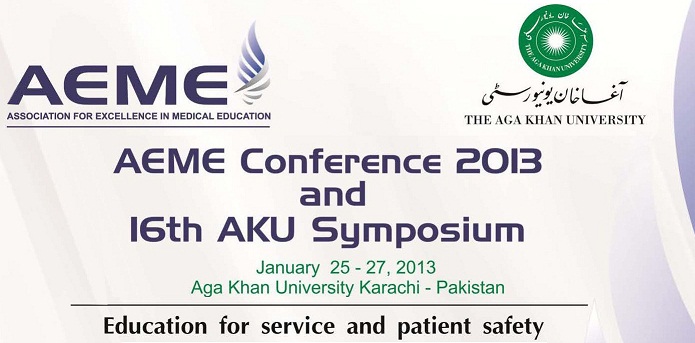Day 1 : Oral Presentations (Theme: Curriculum - Teaching & Learning)
Use of e-learning for the advanced level course on teaching and learning (ALC-T/L) in Master’s in Health Professions Education (MHPE)
Location
AKU Auditorium
Start Date
26-1-2013 4:40 PM
Abstract
Background: MHPE is flexible two-year program offered by the Department for Educational Development at AKU. Each course entails one or two week face-to-face components and eight – twelve week home assignments. The ALC-T/L has been offered since 2006 and plays an integral role in the program. The aim is to educate health professionals in designing, implementation and evaluation of various teaching and learning strategies. Before 2010 this course did not have an e-Learning component where participants could actively engage in flexible learning and get feedback. Keeping in view the unique set of technical challenges in the developing world such as frequent power outages and low Internet bandwidth, we selected a platform which was free and open source, and did not require resource intensive infrastructure.
Methods: We used MOODLE for resources, individual and group assignments and online interaction. Online activities took place before, during and after the course. The sessions were tailored to using and developing resources.
Results: All participants enjoyed the e-Learning strategy and felt that it strongly added to their own teaching toolkit. The session evaluations were taken as average out of 7. The average for each e-Learning-related session of face-to-face component was 5.55, 5.95 and 5.98 on day 1 and 5.80 and 6.37 on day 8. Furthermore, interest in using e-Learning was demonstrated by one of the course participants who used a podcast to deliver their final presentation of the face-to-face component. Participants still use Moodle to communicate, submit their assignments and write in the reflective journal of learning. Conclusions: Based on overwhelmingly positive feedback of participants and their engagement during the distance learning period; the e-Learning strategy will be re-used for future cohorts.
Key words: Blended learning, deeper learning, e-Learning
Use of e-learning for the advanced level course on teaching and learning (ALC-T/L) in Master’s in Health Professions Education (MHPE)
AKU Auditorium
Background: MHPE is flexible two-year program offered by the Department for Educational Development at AKU. Each course entails one or two week face-to-face components and eight – twelve week home assignments. The ALC-T/L has been offered since 2006 and plays an integral role in the program. The aim is to educate health professionals in designing, implementation and evaluation of various teaching and learning strategies. Before 2010 this course did not have an e-Learning component where participants could actively engage in flexible learning and get feedback. Keeping in view the unique set of technical challenges in the developing world such as frequent power outages and low Internet bandwidth, we selected a platform which was free and open source, and did not require resource intensive infrastructure.
Methods: We used MOODLE for resources, individual and group assignments and online interaction. Online activities took place before, during and after the course. The sessions were tailored to using and developing resources.
Results: All participants enjoyed the e-Learning strategy and felt that it strongly added to their own teaching toolkit. The session evaluations were taken as average out of 7. The average for each e-Learning-related session of face-to-face component was 5.55, 5.95 and 5.98 on day 1 and 5.80 and 6.37 on day 8. Furthermore, interest in using e-Learning was demonstrated by one of the course participants who used a podcast to deliver their final presentation of the face-to-face component. Participants still use Moodle to communicate, submit their assignments and write in the reflective journal of learning. Conclusions: Based on overwhelmingly positive feedback of participants and their engagement during the distance learning period; the e-Learning strategy will be re-used for future cohorts.
Key words: Blended learning, deeper learning, e-Learning

